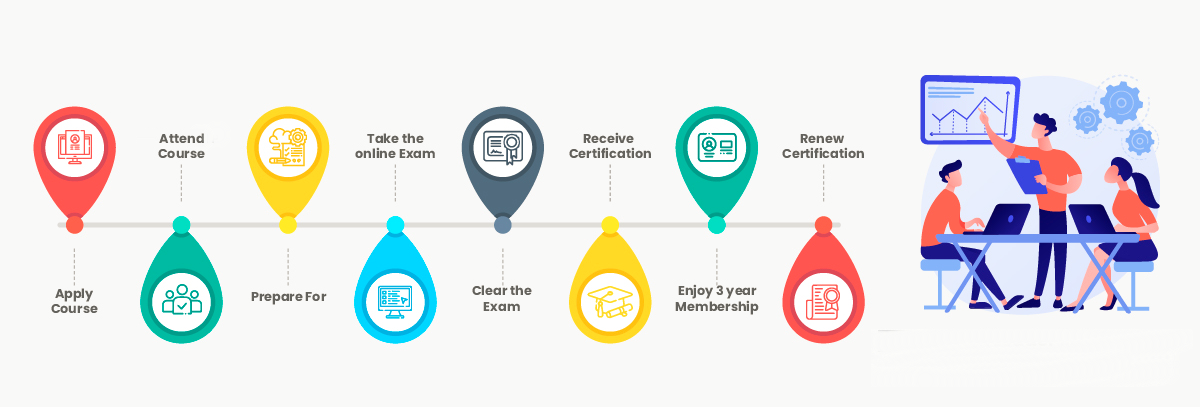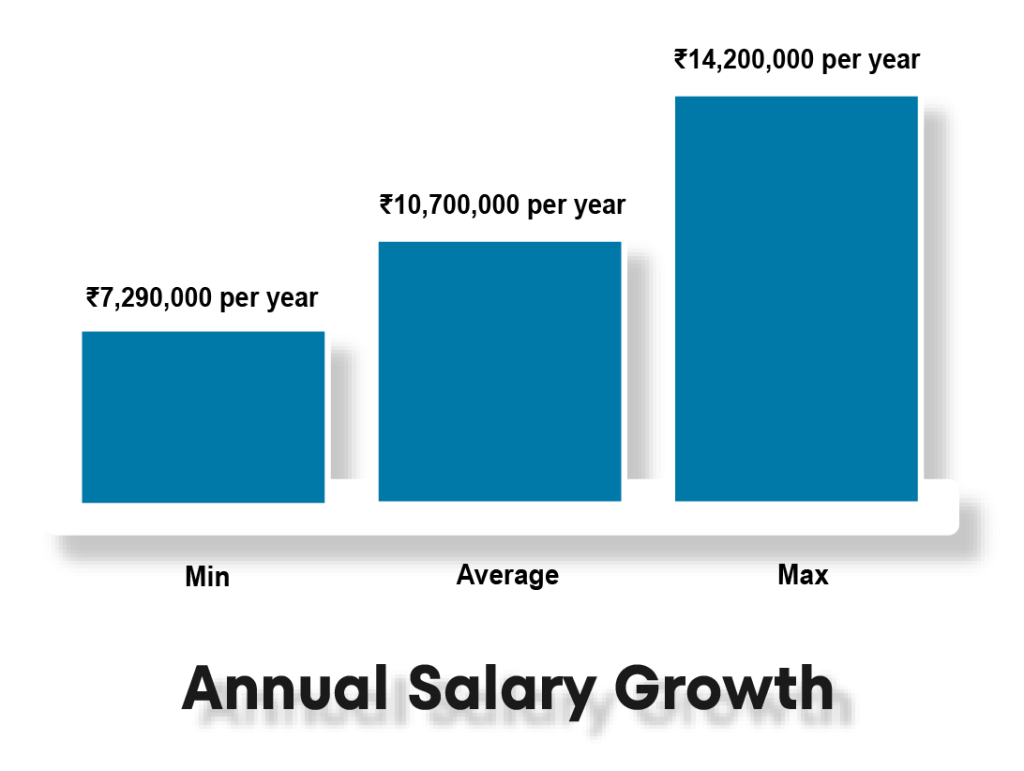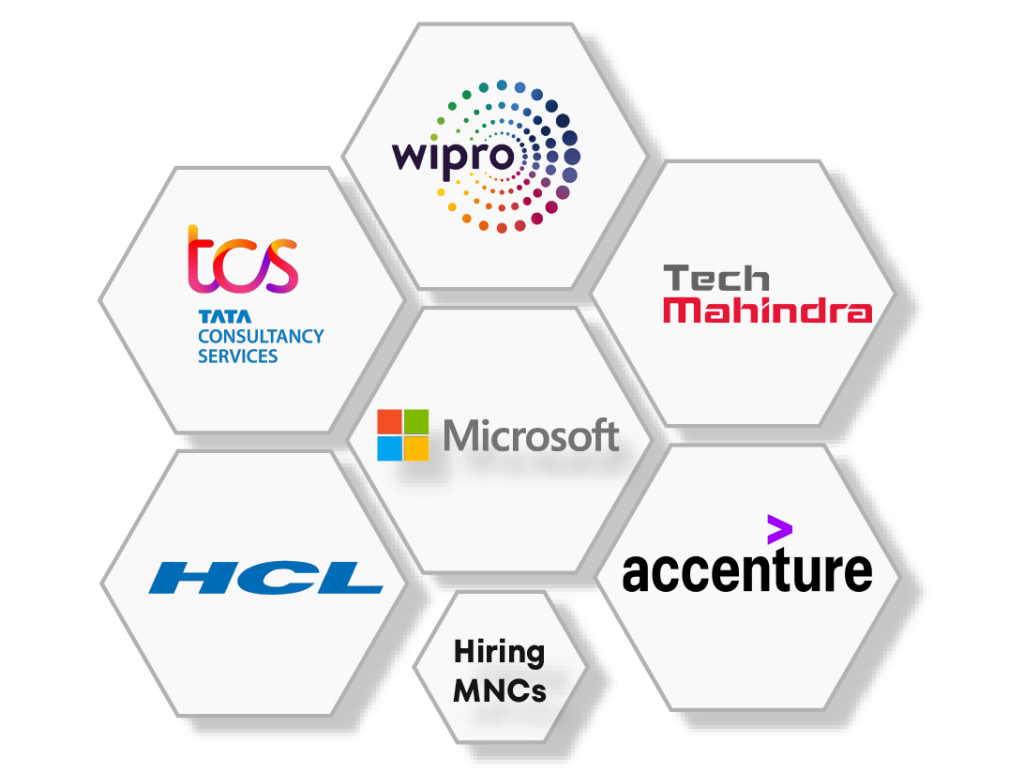
If you want to learn a lot about Microsoft’s cloud platform, Azure, you should think about doing the Microsoft Certification program. This program will teach you important things about Azure services. The Azure certification training is meant to get you ready for the new Microsoft Azure AZ-305 exam. This exam is what you need to take to earn the Azure Solutions Architect Expert certification, and it has replaced two older exams. The Education Nest Azure course is a helpful way to learn how to design cloud architect solutions with Microsoft services.
Application Deadline: Jun 30, 2023
Upskill for Your Dream Job
Sambodhi and Education Nest offer a comprehensive Microsoft Azure Architect course that includes live project-based training. This course is designed to provide hands-on experience in designing and implementing Azure solutions, including infrastructure, security, data platform, and application development. Participants will learn to design and implement Azure services, implement hybrid cloud solutions, and manage and monitor Azure resources. The course includes practical exercises and real-world projects to give participants a solid understanding of Azure architecture best practices and prepare them for the Microsoft Azure certification exams.



Instructor-led Microsoft Azure Architect live online Training Schedule
May 15th – Weekend
July 1st – Weekend
Why enroll for Microsoft Azure Architect Certificate Training Course?

According to the US Bureau of Labor Statistics, the employment of cloud architects, is projected to grow by 10 percent from 2019 to 2029.

Microsoft Azure was positioned as a Leader in the cloud infrastructure and platform services market, alongside other major cloud providers like Amazon Web Services (AWS) and Google Cloud Platform (GCP).

As per Payscale as of September 2021, the average salary for a Microsoft Azure architect is around $131,000 per year, with an estimated salary range between $89,000 to $174,000.

Microsoft Azure Architect Training Course Benefits
Cloud computing is an in-demand skill in today’s job market, and Microsoft Azure is one of the leading cloud platforms. Forbes has reported that the Microsoft Azure market is expected to experience significant growth, with an increase from $182.4 billion in 2018 to $331.2 billion in 2022. This would result in a compound annual growth rate (CAGR) of 12.6%. Completing the Education Nest’s Microsoft Azure Architect training course can help you qualify for higher-paying jobs in the field of cloud computing.

Annual Salary

Hiring Companies
Want to become a Cloud Computing
Professional?
Why Microsoft Azure Architect Certificate Training Course from Education Nest






Microsoft Azure Architect Skills Covered
Microsoft Azure Architect Training Course Syllabus
Border Gateway Protocol
Azure App Insights
Azure Services for Migration
Border Gateway Protocol
Azure App Insights
Azure Services for Migration
Microsoft Azure Architect Training Projects

In the retail industry, Microsoft Azure Architect projects can help organizations to enhance their customer experience, optimize their supply chain, and increase operational efficiency. For example, Azure can be used to build a personalized shopping experience for customers, leveraging data analytics and machine learning to recommend products and offers based on their browsing and purchase history. Azure can also be used to optimize inventory management and reduce waste by leveraging predictive analytics and IoT sensors. Additionally, Azure can help retailers to implement secure and scalable e-commerce platforms, manage their financial transactions, and provide real-time insights into their business performance through dashboards and reports.

As more organizations move their infrastructure to the cloud, the demand for skilled Microsoft Azure architects is increasing in the IT industry. Azure architects are responsible for designing and implementing cloud-based solutions that meet business requirements while ensuring security, scalability, and cost-efficiency. Some of the common projects for Azure architects include designing and implementing cloud-based data platforms, building scalable and reliable applications, implementing disaster recovery and business continuity plans, and integrating on-premises infrastructure with the cloud. With the right skills and expertise, Azure architects can help organizations optimize their cloud investments and accelerate their digital transformation journey.
Microsoft Azure Architect Training Description
The Microsoft Azure Architect course is designed for professionals who want to master the skills required for designing and implementing cloud-based solutions on the Microsoft Azure platform. The course covers a range of topics, including Azure infrastructure, security, data platforms, and application development, and provides hands-on experience through live project-based training. Participants will learn to design and implement Azure services, optimize costs, and ensure compliance and security in the cloud environment. The course also prepares participants for the Microsoft Azure certification exams, making it an ideal choice for professionals who want to advance their careers in the cloud computing industry.
The main objectives of the Microsoft Azure Architect course are:
There are several reasons why professionals should consider learning the Microsoft Azure Architect course. Some of the main reasons are:
Increased demand: The demand for skilled Azure architects is increasing as more organizations move to the cloud.
Career advancement: Learning Azure architecture can help professionals advance their careers in the cloud computing industry and open up new job opportunities.
High earning potential: Azure architects are among the highest-paid professionals in the IT industry, with the potential to earn six-figure salaries.
Versatility: Azure architecture is a versatile skill that can be applied to a range of industries and job roles, making it a valuable addition to any professional’s skillset.
Future-proofing: Azure is a leading cloud computing platform and is expected to grow in popularity in the coming years, making it a smart choice for professionals looking to future-proof their careers.
Real-world application: Azure architecture skills can be applied to real-world projects and scenarios, making it a practical and useful skill to have.
The Microsoft Azure Architect course is suitable for:
Anyone who is interested in pursuing a career in the IT industry and wants to learn about the latest technologies and trends in Microsoft Azure Architect.
The pre-requisites for the Microsoft Azure Architect course are:
Basic knowledge of cloud computing concepts and principles, including virtualization, storage, and networking.
Familiarity with at least one programming language, such as C# or Java.
Understanding of database concepts and experience working with databases, such as SQL Server or MySQL.
Basic understanding of security and compliance concepts in the context of cloud computing.
Experience working with the Microsoft Azure platform, including familiarity with Azure services, management tools, and the Azure portal.
Note that while these pre-requisites are not mandatory, having a basic understanding of these concepts will help participants get the most out of the course and improve their chances of success.
Here are some other popular software for cloud computing:
Amazon Web Services (AWS): A comprehensive cloud computing platform that provides a wide range of services for computing, storage, and databases, as well as tools for machine learning, analytics, and Internet of Things (IoT) applications.
Google Cloud Platform (GCP): A cloud computing platform that offers infrastructure, platform, and software as a service (IaaS, PaaS, and SaaS) solutions for computing, storage, and data analytics.
IBM Cloud: A cloud computing platform that provides infrastructure, platform, and software as a service (IaaS, PaaS, and SaaS) solutions for computing, storage, and data management.
VMware Cloud: A cloud computing platform that offers a range of solutions for hybrid and multi-cloud environments, including virtualization, infrastructure, and management tools.
Oracle Cloud Infrastructure (OCI): A cloud computing platform that provides a range of services for building, deploying, and managing applications and services through Oracle-managed data centers.
Amazon Elastic Compute Cloud (EC2): A web service that provides resizable compute capacity in the cloud, making it easier for developers to scale their applications.
The Microsoft Azure Architect course is designed for professionals who want to master the skills required for designing and implementing cloud-based solutions on the Microsoft Azure platform. The course covers a range of topics, including Azure infrastructure, security, data platforms, and application development, and provides hands-on experience through live project-based training. Participants will learn to design and implement Azure services, optimize costs, and ensure compliance and security in the cloud environment. The course also prepares participants for the Microsoft Azure certification exams, making it an ideal choice for professionals who want to advance their careers in the cloud computing industry.
The main objectives of the Microsoft Azure Architect course are:
There are several reasons why professionals should consider learning the Microsoft Azure Architect course. Some of the main reasons are:
Increased demand: The demand for skilled Azure architects is increasing as more organizations move to the cloud.
Career advancement: Learning Azure architecture can help professionals advance their careers in the cloud computing industry and open up new job opportunities.
High earning potential: Azure architects are among the highest-paid professionals in the IT industry, with the potential to earn six-figure salaries.
Versatility: Azure architecture is a versatile skill that can be applied to a range of industries and job roles, making it a valuable addition to any professional’s skillset.
Future-proofing: Azure is a leading cloud computing platform and is expected to grow in popularity in the coming years, making it a smart choice for professionals looking to future-proof their careers.
Real-world application: Azure architecture skills can be applied to real-world projects and scenarios, making it a practical and useful skill to have.
The Microsoft Azure Architect course is suitable for:
Anyone who is interested in pursuing a career in the IT industry and wants to learn about the latest technologies and trends in Microsoft Azure Architect.
The pre-requisites for the Microsoft Azure Architect course are:
Basic knowledge of cloud computing concepts and principles, including virtualization, storage, and networking.
Familiarity with at least one programming language, such as C# or Java.
Understanding of database concepts and experience working with databases, such as SQL Server or MySQL.
Basic understanding of security and compliance concepts in the context of cloud computing.
Experience working with the Microsoft Azure platform, including familiarity with Azure services, management tools, and the Azure portal.
Note that while these pre-requisites are not mandatory, having a basic understanding of these concepts will help participants get the most out of the course and improve their chances of success.
Here are some other popular software for cloud computing:
Amazon Web Services (AWS): A comprehensive cloud computing platform that provides a wide range of services for computing, storage, and databases, as well as tools for machine learning, analytics, and Internet of Things (IoT) applications.
Google Cloud Platform (GCP): A cloud computing platform that offers infrastructure, platform, and software as a service (IaaS, PaaS, and SaaS) solutions for computing, storage, and data analytics.
IBM Cloud: A cloud computing platform that provides infrastructure, platform, and software as a service (IaaS, PaaS, and SaaS) solutions for computing, storage, and data management.
VMware Cloud: A cloud computing platform that offers a range of solutions for hybrid and multi-cloud environments, including virtualization, infrastructure, and management tools.
Oracle Cloud Infrastructure (OCI): A cloud computing platform that provides a range of services for building, deploying, and managing applications and services through Oracle-managed data centers.
Amazon Elastic Compute Cloud (EC2): A web service that provides resizable compute capacity in the cloud, making it easier for developers to scale their applications.
Microsoft Azure Architect Certificate Training Course reviews
Read learner testimonials
Hannah Turner
I had the pleasure of attending a virtual training session on 'Microsoft Azure Architect' organized by Sambodhi and Education Nest. The course was a great learning experience, and I was able to gain knowledge on many new concepts.
Avery Parker
The training provided by Sambodhi was excellent. The trainer was highly knowledgeable and able to address all the queries with ease. Thank you for providing such a valuable learning experience.
Tajendar
It was engaging, practical, and encouraged active participation. The hands-on approach enabled participants to apply what they learned directly, which was very beneficial. Overall, the course was enjoyable, and I am excited to apply the knowledge gained from it.
Hear from our learners
Lorem ipsum dolor sit amet, consectetur adipiscing elit. Ut elit tellus, luctus nec ullamcorper mattis, pulvinar dapibus leo.
Lorem ipsum dolor sit amet, consectetur adipiscing elit. Ut elit tellus, luctus nec ullamcorper mattis, pulvinar dapibus leo.
Lorem ipsum dolor sit amet, consectetur adipiscing elit. Ut elit tellus, luctus nec ullamcorper mattis, pulvinar dapibus leo.
Like what you hear from our learners?
Creating Epic Presentations: Communicating Powerful Ideas reviews
Microsoft Azure Architect Training FAQs
If you miss an online Microsoft Azure Architect Training class, it’s important to reach out to the instructor or the support team of the online training platform you are using. They may be able to provide you with a recording or transcript of the missed class, so that you can catch up on what you missed. Alternatively, some platforms offer on-demand access to class materials, so you can go back and review the content on your own time. It’s always a good idea to try and make up the missed material as soon as possible, so that you don’t fall behind in your learning.
If you have queries after completing an online Microsoft Azure Architect Training course, Education Nest training platforms offer some form of post-course support. This may include access to a dedicated support team, a community forum where you can ask questions and connect with other learners, or even one-on-one sessions with an instructor or coach. If you have specific questions or concerns related to the course material, you can reach out to the instructor directly or use the support channels provided by the platform. It’s always a good idea to clarify any doubts or questions you may have, as this will help to solidify your understanding of the material and ensure that you can apply what you’ve learned in a real-world context.
Microsoft Azure Architect is a professional certification that validates a person’s expertise in designing and implementing Microsoft Azure solutions. As an Azure Architect, an individual is responsible for designing and managing cloud-based solutions that meet the needs of organizations. This includes designing cloud infrastructure, configuring and deploying services, and ensuring the security and compliance of cloud environments. Azure Architects are also responsible for optimizing cloud performance and managing resources to ensure maximum efficiency and cost-effectiveness. The certification demonstrates that an individual has the knowledge and skills required to architect, design, and implement Azure solutions that meet business requirements and industry best practices.
The timing of when you get access to learning content after signing up for an online Microsoft Azure Architect Training course will depend on the specific training platform you are using. In most cases, you should receive access to the learning content immediately upon signing up, or shortly after your payment has been processed. Some platforms may require you to complete an enrolment process or set up an account before you can access the content. It’s always a good idea to check the specific details of the course or platform you are using, as the timing and process may vary. If you are experiencing any issues accessing the learning content, you should contact the support team of the training platform for assistance.
Once you enrol in Microsoft Azure Architect Training course, you will typically have access to the course material for as long as the course remains available on the platform. This means that you can revisit the material at any time, even after you have completed the course, and continue to learn and improve your skills. The benefit of lifetime access to the learning material is that it allows you to learn at your own pace and on your own schedule. You can review the content as many times as you need to fully understand the concepts and techniques covered in the course. Additionally, if you encounter a new challenge in your work or personal life, you can go back to the course material to find solutions and strategies to help you overcome the challenge. Having access to course material for a lifetime is a valuable benefit, as it allows you to continue to improve your skills and knowledge long after you have completed the course. So, if you are interested in improving your Azure skills and want the flexibility to learn at your own pace, consider enrolling in an Microsoft Azure Architect Training course that offers lifetime access to the learning material.
If you miss an online Microsoft Azure Architect Training class, it’s important to reach out to the instructor or the support team of the online training platform you are using. They may be able to provide you with a recording or transcript of the missed class, so that you can catch up on what you missed. Alternatively, some platforms offer on-demand access to class materials, so you can go back and review the content on your own time. It’s always a good idea to try and make up the missed material as soon as possible, so that you don’t fall behind in your learning.
If you have queries after completing an online Microsoft Azure Architect Training course, Education Nest training platforms offer some form of post-course support. This may include access to a dedicated support team, a community forum where you can ask questions and connect with other learners, or even one-on-one sessions with an instructor or coach. If you have specific questions or concerns related to the course material, you can reach out to the instructor directly or use the support channels provided by the platform. It’s always a good idea to clarify any doubts or questions you may have, as this will help to solidify your understanding of the material and ensure that you can apply what you’ve learned in a real-world context.
Microsoft Azure Architect is a professional certification that validates a person’s expertise in designing and implementing Microsoft Azure solutions. As an Azure Architect, an individual is responsible for designing and managing cloud-based solutions that meet the needs of organizations. This includes designing cloud infrastructure, configuring and deploying services, and ensuring the security and compliance of cloud environments. Azure Architects are also responsible for optimizing cloud performance and managing resources to ensure maximum efficiency and cost-effectiveness. The certification demonstrates that an individual has the knowledge and skills required to architect, design, and implement Azure solutions that meet business requirements and industry best practices.
The timing of when you get access to learning content after signing up for an online Microsoft Azure Architect Training course will depend on the specific training platform you are using. In most cases, you should receive access to the learning content immediately upon signing up, or shortly after your payment has been processed. Some platforms may require you to complete an enrolment process or set up an account before you can access the content. It’s always a good idea to check the specific details of the course or platform you are using, as the timing and process may vary. If you are experiencing any issues accessing the learning content, you should contact the support team of the training platform for assistance.
Once you enrol in Microsoft Azure Architect Training course, you will typically have access to the course material for as long as the course remains available on the platform. This means that you can revisit the material at any time, even after you have completed the course, and continue to learn and improve your skills. The benefit of lifetime access to the learning material is that it allows you to learn at your own pace and on your own schedule. You can review the content as many times as you need to fully understand the concepts and techniques covered in the course. Additionally, if you encounter a new challenge in your work or personal life, you can go back to the course material to find solutions and strategies to help you overcome the challenge. Having access to course material for a lifetime is a valuable benefit, as it allows you to continue to improve your skills and knowledge long after you have completed the course. So, if you are interested in improving your Azure skills and want the flexibility to learn at your own pace, consider enrolling in an Microsoft Azure Architect Training course that offers lifetime access to the learning material.
Be future ready, start learning